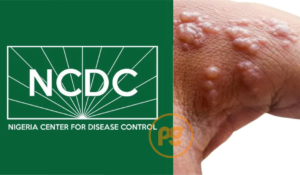The Nigeria Centre for Disease Control and Prevention (NCDC) announced on Friday that the country has confirmed 40 cases of mpox out of 830 suspected cases.
NCDC Director-General, Dr. Jide Idris, made this known during a Joint NCDC/World Health Organisation (WHO) National Mpox briefing in Abuja, attended by key stakeholders and partners.
The WHO Nigeria Country Office revealed that Nigeria is set to receive doses of the mpox vaccine through a donation from the United States Government.
Dr. Idris emphasized that since mpox was declared a Public Health Emergency of International Concern, the NCDC has established an Emergency Operations Centre and an Incident Management System to tackle the outbreak.

“Currently, we have 40 confirmed cases out of 830 suspected cases, with no recorded deaths, which is remarkable,” Dr. Idris stated. “We have developed an incident action plan to address each area, using various pillars. We’ve engaged with state governments and Health Commissioners to guide them in setting up emergency preparedness and response teams, which they will coordinate with their respective Local Government Areas.”
Dr. Idris highlighted the importance of surveillance, noting that the 40 confirmed cases are spread across 12 or 13 states, with most cases in the South-South and South-East regions, as well as some in Lagos, Ogun, and northern states. “Our focus is on these areas to reduce the number of cases and enhance active surveillance to detect more cases,” he added.
The NCDC is also working to strengthen its laboratory services. “All confirmed cases so far have been validated through genomic sequencing in two labs — the National Research Lab in Abuja and Lagos. However, due to the spread, we need to increase the number of testing laboratories, including facilities like the Lagos University Teaching Hospital and the African Centre for Genomics,” Dr. Idris explained.
He further stressed the need to enhance laboratory capabilities, particularly in the South-South and South-East regions. Additionally, the centre is intensifying public awareness campaigns to educate the public about the disease, its symptoms, and preventive measures.
Addressing challenges, Dr. Idris mentioned that the NCDC is working on improving data collection processes.
Meanwhile, WHO Country Representative, Dr. Walter Mulombo, underscored the importance of staying vigilant and monitoring microbes in nature that could potentially cause the disease.




